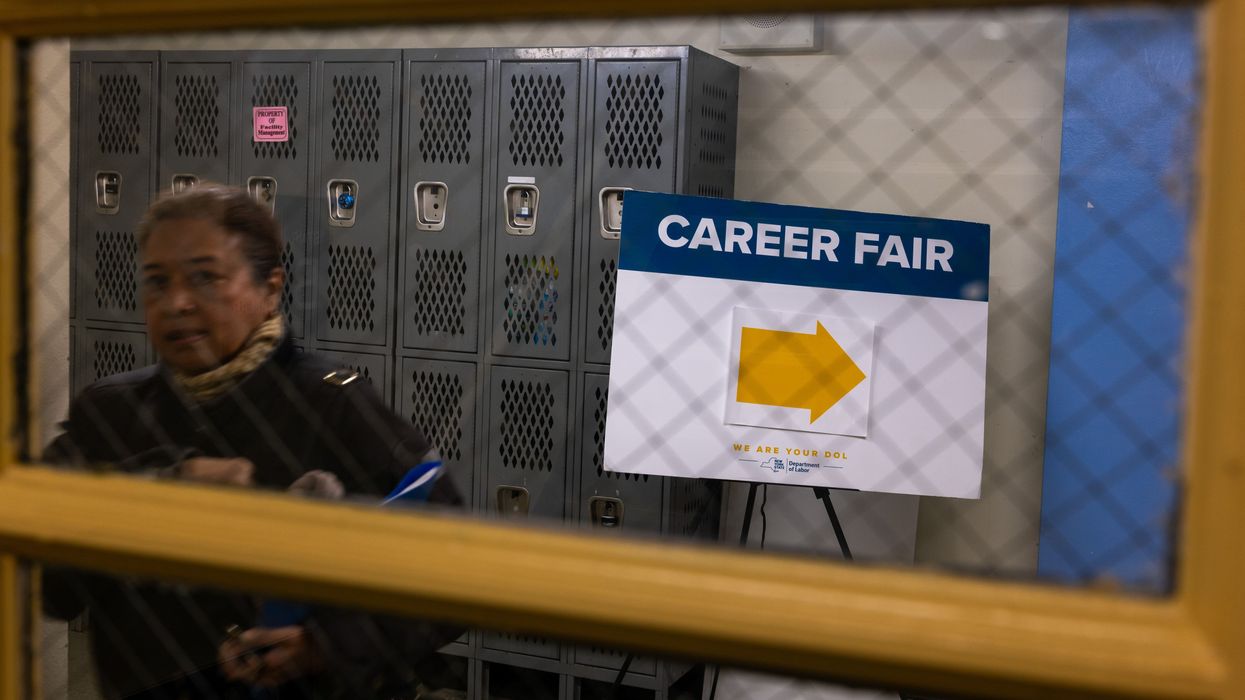November, 14 2017, 02:00pm EDT

New Interactive Map Tracks Labor Law Preemption Nationwide
Since 2010, Republican-controlled state legislatures have increasingly used preemption laws to strike down local government efforts to improve the working conditions of their residents. EPI's new interactive map tracks the rise of preemption in five key areas of labor and employment: minimum wage, paid leave, fair work schedules, prevailing wages, and project labor agreements.
WASHINGTON
Since 2010, Republican-controlled state legislatures have increasingly used preemption laws to strike down local government efforts to improve the working conditions of their residents. EPI's new interactive map tracks the rise of preemption in five key areas of labor and employment: minimum wage, paid leave, fair work schedules, prevailing wages, and project labor agreements. The map, which will be updated as laws change, features information about each state's labor and employment preemption laws, including when the laws were implemented and what they entail, and paints a picture of the rise of anti-worker preemption laws across the country.
"With inaction at the federal and state level, working people have increasingly relied on local government to raise labor standards. Now, those protections are being stripped away, by mostly conservative state legislators, through the widespread use of preemption laws," said EPI Associate Labor Counsel Marni von Wilpert. "This map will be a powerful tool for working people to find out how state legislators are pushing labor standards down, so that they can hold them accountable for their actions."
EPI recently released a paper explaining the rise of preemption laws across the country. Recent examples include:
- In 2011, the Wisconsin legislature passed a preemption law to nullify Milwaukee's paid sick leave ordinance--even though Milwaukee voters had approved the ordinance in a 2008 ballot initiative with 69 percent support.
- In 2015, the Birmingham City Council raised the city's minimum wage to $8.50 effective July 2016 and to $10.10 effective July 2017. But the Alabama state legislature quickly passed a minimum wage preemption law, reversing Birmingham's ordinance and ensuring the city's minimum wage would remain stuck at $7.25.
- On August 28, 2017, the Missouri state legislature enacted a preemption law that actually lowered the minimum wage in St. Louis, from the city's minimum wage of $10 to back down to the statewide minimum wage of $7.70 an hour--undercutting the raises of the approximately 31,000 workers who benefited from the city's minimum wage increase to $10 per hour.
"America's workers need better jobs and stronger labor standards," said von Wilpert. "Local governments are raising the bar on labor standards to include higher wages and the ability to earn paid leave to recover from illness or care for family members. Once communities organize for these improvements, they should not be stripped away by state legislators, most of whom are far removed from the communities these preemption laws affect."
EPI is an independent, nonprofit think tank that researches the impact of economic trends and policies on working people in the United States. EPI's research helps policymakers, opinion leaders, advocates, journalists, and the public understand the bread-and-butter issues affecting ordinary Americans.
(202) 775-8810LATEST NEWS
New Unemployment Claims Jump to Highest Level in Months as Trump Economy Teeters
"While President Trump calls affordability a ‘hoax,’ countless families are being forced into impossible tradeoffs every day."
Dec 11, 2025
Federal data released Thursday shows that the number of Americans filing for unemployment benefits surged last week, another indication of growing instability in President Donald Trump's economy as corporations lay off workers en masse and prices continue to rise.
For the week ending December 6, new unemployment claims jumped to 236,000—an increase of 44,000 from the previous week, according to figures from the US Labor Department.
Andrew Stettner, an unemployment insurance expert at The Century Foundation (TCF) noted that new unemployment claims are now at their highest level since early September.
"These totals don’t include an additional 12,732 former federal workers who are also now relying on unemployment benefits, as the number of federal workers on UI has stayed at levels not seen since the pandemic, even after the government shutdown has ended," Stettner said.
"This disappointing news comes on the heels of other troubling labor market data," he continued, pointing to private-sector payroll figures showing the US economy lost 32,000 jobs in November. "With hiring still so weak, it is no surprise that the percentage of workers feeling confident enough to quit their job dropped to its lowest level since the beginning of the pandemic in April 2020. In fact, our polling shows that 27% of Americans said they took on a 'second job, side hustle, or gig work' in the past year to help make ends meet."
The updated unemployment numbers come as Trump is on an economic messaging tour during which he has dismissed the notion that his policies have worsened the country's affordability crisis, calling such claims a Democratic "hoax" even as polling shows Americans—including a significant percentage of his own voters—increasingly blame the president for rising costs groceries and other necessities.
"We inherited the highest prices ever, and we’re bringing them down,” Trump said, falsely, during a stop in Pennsylvania earlier this week.
"We’re crushing it, and you’re getting much higher wages,” the president added, another falsehood.
Survey data released Thursday by The Century Foundation shows that Americans are increasingly skipping meals and doctor visits as prices rise.
"Roughly three in 10 voters delayed or skipped medical care in the past year due to cost, while nearly two-thirds switched to cheaper groceries or bought less food altogether," the group noted in a summary of its findings. "About half tapped into their savings to cover everyday expenses."
Julie Margetta Morgan, president of The Century Foundation, said in a statement that "while President Trump calls affordability a ‘hoax,’ countless families are being forced into impossible tradeoffs every day as a result of Trump’s disastrous policies that are jacking up prices."
"Working-class Americans are living in a different, harsher economy under Trump," Morgan added, "and they feel the impacts of financialization—and the added risks and costs that come with it—most severely."
Keep ReadingShow Less
Trump Economic Approval Hits All-Time Low as White House Official Insists ‘Nothing Bad Is Happening’
“Trump’s claims about inflation are false, and you can go to the grocery store and see it yourself,” said one economist.
Dec 11, 2025
A new poll shows US voters' approval of President Donald Trump's handling of the economy has hit an all-time low, even as the president and his officials insist the economy is the best in the world.
The latest Associated Press-NORC Center for Public Affairs Research poll released Thursday found that only 31% of voters approve of Trump's handling of the economy, the lowest figure in that survey throughout either of his two terms in office. Overall, 68% of voters said that the current state of the economy was "poor."
What's more, Trump's approval rating on the economy among Republican voters now stands at just 69%, a strikingly low figure for a president who has consistently commanded loyalty from the GOP base.
Despite the grim numbers, the president and his administration have continued to say that the US is now in the middle of an economic boom.
During a Thursday morning interview on CNBC, Commerce Secretary Howard Lutnick said that the US now has "the greatest $30 trillion economy in the world."
"We are doing great," Lutnick said. "Nothing bad is happening. Greatness is happening. We grew at 4% GDP! Come on!"
Lutnick: "Jay Powell is too afraid to lead the greatest $30t economy in the world. We should be leading with our front foot. Instead we are always leaning back as if something bad is happening. We are doing great. Nothing bad is happening. Greatness is happening. We're growing 4%… pic.twitter.com/uWqrlwpllE
— Aaron Rupar (@atrupar) December 11, 2025
Lutnick's message echoes the one Trump delivered earlier this week during a rally in Pennsylvania, where he said that voters' concerns about being able to afford basics such as groceries, electricity, and healthcare were a "hoax" concocted by Democrats.
"Prices are coming down very substantially," Trump falsely claimed during his speech. "But they have a new word. You know, they always have a hoax. The new word is affordability."
Trump on the US economy: “I said it the other day. And a lot of people misinterpreted it. They said ‘Oh he doesn’t realize prices are high.’ Prices are coming down very substantially. But they have a new word. You know, they always have a hoax. The new word is affordability.” pic.twitter.com/JkErFnkT1D
— Sahil Kapur (@sahilkapur) December 10, 2025
As NPR reported on Thursday, data shows that the prices of groceries and electricity have continued to rise throughout Trump's second term, directly contradicting his claims that prices are "coming down."
University of Michigan economist Betsey Stevenson told NPR that Trump is playing with fire by making false claims about prices when US consumers can see costs persistently going up.
"Trump's claims about inflation are false, and you can go to the grocery store and see it yourself," Stevenson said.
Even some members of Trump's own party are growing wary of him insisting that America is experiencing an unprecedented economic boom when voters feel otherwise.
Sen. Lisa Murkowski (R-Alaska) told The Hill that Trump's insistence on making happy talk about the economy would not fly with voters.
"You can’t call it a hoax and suggest that people are going to believe it," she said. "What you say matters."
An anonymous Republican senator also told The Hill that they were concerned about the optics of Trump building a massive luxury ballroom in the White House at a time when Americans say they are struggling financially.
"The cost of living just makes life very difficult on people," the senator stressed.
And Sen. Shelley Moore Capito (R-W.Va.) gently pushed back on Trump's messaging by telling CNN that "a lot of people are still having trouble making ends meet" in her state.
Keep ReadingShow Less
Trump Tariffs Have Cost Average US Family Nearly $1,200 So Far
"The president’s tax on American families is simply making things more expensive.”
Dec 11, 2025
As President Donald Trump persistently claims the economy is working for Americans, Democrats in the US House and Senate on Thursday released an analysis that puts a number to the recent polling that's found many Americans feel squeezed by higher prices: $1,200.
That's how much the average household in the US has paid in tariff costs over the past 10 months, according to the Joint Economic Committee—and costs are expected to continue climbing.
The Democrats, including Ranking Member Sen. Maggie Hassan (D-NH), Sen. Martin Heinrich (D-NM), and Rep. Sean Casten (D-Ill.), analyzed official US Treasury Department data on the amount of tariff revenue collected since the beginning of Trump's second term as he's imposed tariffs across the European Union and on dozens of other countries—some as high as 50%.
The White House has insisted the tariffs on imports will "pry open foreign markets" and force exporters overseas to pay more, resulting in lower prices for US consumers.
But the JEC combined the Treasury data with independent estimates of the percent of each tariff dollar that is paid by consumers, as companies pass along their higher import prices to them.
At first, US families were paying an average of less than $60 in tariff costs when Trump began the trade war in February and March.
But that amount shot up to more than $80 per family in April when he expanded the tariffs, and monthly costs have steadily increased since then.
In November, a total of $24.04 billion was paid by consumers in tariff costs—or $181.29 per family.
“While President Trump promised that he would lower costs, this report shows that his tariffs have done nothing but drive prices even higher for families."
From February-November, families have paid an average of $1,197.50 each, according to the JEC analysis.
“While President Trump promised that he would lower costs, this report shows that his tariffs have done nothing but drive prices even higher for families,” said Hassan.
If costs remain as high as they were over the next 12 months, families are projected to pay $2,100 per year as a result of Trump's tariffs.
The analysis comes a week after Republicans on a House Ways and Means subcommittee attempted to avoid the topic of tariffs—which have a 61% disapproval rating among the public, according to Pew Research—at a hearing on global competitiveness for workers and businesses.
"Rep. Jimmy Gomez [D-Calif.] read several quotes from [former Rep. Kevin] Brady [R-Texas] during his time in Congress stating that tariffs are taxes that impede economic growth. Brady, who chaired the Ways and Means Committee and drafted Trump’s first tax law in 2017 (and now works as a lobbyist), had no desire to discuss those quotes or the topic of tariffs," wrote Steve Warmhoff, federal policy director at the Institute on Taxation and Economic Policy. "Nor did Republicans address the point made by the Democrats’ witness, Kimberly Clausing, when she explained that Trump’s tariffs are the biggest tax increase on Americans (measured as a share of the economy) since 1982."
Clausing estimated that the tariffs will amount "to an annual tax increase of about $1,700 for an average household" if they stay at current levels, while Trump's decision to lower tariffs on goods such as meat, vegetables, fruits, and coffee last month amounted to just $35 in annual savings per household.
The JEC has also recently released analyses of annual household electricity costs under Trump, which were projected to go up by $100 for the average family despite the president's campaign pledge that "your energy bill within 12 months will be cut in half."
Last month the panel found that the average household is spending approximately $700 more per month on essentials like food, shelter, and energy since Trump took office.
“At a time when both parties should be working together to lower costs," said Hassan on Thursday, "the president’s tax on American families is simply making things more expensive.”
Keep ReadingShow Less
Most Popular


